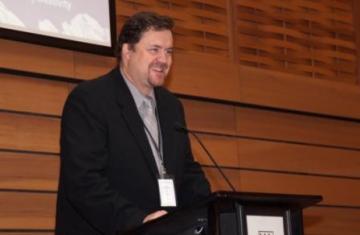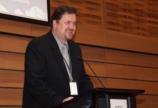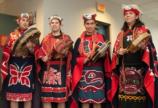Stories of success and inspiration created a meaningful backdrop for discussion that took place at the 2011 symposium hosted by Professor James Hopkins, the UVic National Aboriginal Economic Development Chair.
"The stories help us appreciate and understand the challenges faced by Aboriginal peoples across Canada when asserting their cultural identity in the pursuit of economic development," said Hopkins.
Hopkins, who hosted the third annual symposium on March 29, 2011, reported on his activities, which focussed on issues surrounding aboriginal economic development rights, law and policy. Challenges and debate over who controls what, Hopkins noted, "create the most significant uncertainty in First Nations and Aboriginal economies." The resulting harm to Aboriginal communities he said, "includes the most basic things people take for granted, like clean drinking water, or being able to enforce a lease that is quick and easy." He emphasized the importance of consultation.
"It must focus squarely on the day-to-day business issues between governments-it is always in the best interests of the First Nations government to know what the other party's perspective is, because that way they [the First Nations] can make an informed choice about how they want to legitimately structure their business affairs."
Hopkins pointed out the need for practical application of this knowledge. He and students partnered with national Aboriginal organizations to advocate in a Supreme Court of Canada case dealing with on-reserve tax policy in Quebec. They also provided commentary on a recent inter-governmental agreement between Ontario First Nations and the Province with regard to the HST.
UVic law student Racquel Fraser, a member of the Ahtahkakoop Cree Nation, gained experience working as a research assistant for the chair. As part of her duties, she examined the legal basis from which the federal government derives its authority to acquire new lands and hold them trust for First Nations people.
Hopkins was able to undertake practical, community-based research for the Saanich-based Tsawout First Nation working with research assistant and UVic master's of law candidate Jeanette Gevikoglu. Her research examined issues related to managing development especially with regard to enforcement and wild life management. She looked at policy and practice related to conservation, trespassing and pollution.
The day-long session featured key note speaker Dr. Brian Calliou, program director of the Banff Centre's Aboriginal Leadership and Management Program and a member of the Sucker Creek First Nation. The central theme of his talk, From Paternalism to Partnership, the New Relationship for Aboriginal Economic Development, focused on how the imposed laws and policies that marginalized Indigenous peoples and put them into a dependent state are now being used by tribal organizations to protect their rights and advance their aspirations. He believes the new relationship that is slowly being built on consultation and partnership gives them a second chance at the treaty process, "to get it right," he says. "I believe that economic development isn't just about jobs and businesses; it's about development of the whole community and takes the whole community to be successful."
In the panel discussions on Aboriginal Entrepreneurship and Regional Ventures, Brenda Baptiste a member of the Osoyoos First Nation and senior administrator to the Tsleil-Waututh First Nation, talked about its economic development strategies that started with the formation of Takaya Developments and a partnership with the Hong Kong-based Kuok family. She shared the development vision of then-Chief Leonard George that resulted in the development of Raven Woods, one of the first reserve-based residential condominium developments in BC. She said his first concern was determining whether there was a values and culture match with the potential partner, then he'd do business based on a handshake.
Dr. Cora Voyageur spoke at the panel on Aboriginal Women in Leadership and Business about her research into women entrepreneurs. She is an active teacher, researcher and writer with the Department of Sociology at the University of Calgary and member of the Athabasca Chipewyan First Nation. Her study was conducted in 2008 and 2009 with a sample of 50 M&e#180;tis and First Nations women entrepreneurs across Alberta. She found that 72 per cent had some post-secondary education, that most came from an entrepreneurial family, but that none took over the family business or received any financial help from government-they all used their own source of funds to start their venture. Perhaps the most revealing finding was on wages. Compared to the $23,000 in average annual salary earned by Canadian Aboriginal women, female Aboriginal business owners earned significantly more, with typical incomes ranging between $50,000 and $100,000.
The symposium wrapped up with a special dinner held at the Royal BC Museum. Guests enjoyed a presentation by the Le-la-la Dancers and Richard Wagamese, an award-winning Ojibway author serving as the 2011 Harvey Stevenson Southam Guest Lecturer in writing at UVic, created a special story for the event. His story about the perseverance of a young boy to overcome physical challenges and communicate with his people reminded the audience of the past and foretold a brighter future.



